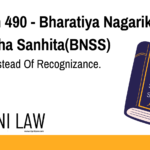Code: Section 493 BNSS
When any surety to a bail bond under this Sanhita becomes insolvent or dies,
or when any bond is forfeited under the provisions of section 491, the Court by whose order
such bond was taken, or a Magistrate of the first class may order the person from whom
such security was demanded to furnish fresh security in accordance with the directions of
the original order, and if such security is not furnished, such Court or Magistrate may
proceed as if there had been a default in complying with such original order.
Explanation of Section 493 BNSS
Section 493 of the Bharatiya Nagarik Suraksha Sanhita (BNSS) explains the steps a Court takes when a surety to a bail bond becomes insolvent, dies, or when the bond is forfeited under Section 491.
Key Points:
- Insolvency or Death of Surety: If the surety becomes insolvent or dies, the person who is bound by the bond must provide fresh security.
- Forfeiture of Bond: When a bond is forfeited, the person may be ordered to provide fresh security.
- Failure to Provide Fresh Security: If the person fails to provide the required security, the Court may treat this as default and proceed with legal action.
This section ensures that bail bond obligations are upheld, even if certain circumstances arise that affect the bond’s validity.
Illustration
Example 1: Death of Surety
Scenario: A person is granted bail with the help of a surety. The surety dies unexpectedly.
What Happens: The Court will require the person on bail to provide a new surety or fresh security. Failure to do so may result in legal consequences.
Example 2: Insolvency of Surety
Scenario: A surety becomes insolvent after signing a bail bond for someone.
What Happens: The person on bail must provide fresh security. If they fail, the Court can proceed as if they defaulted on their obligations.
Example 3: Forfeiture of Bond
Scenario: The person on bail fails to meet the bond’s conditions, resulting in the forfeiture of the bond.
What Happens: The Court will require the person to provide fresh security. If they do not comply, they may be treated as in default.
Common Questions and Answers on Section 493 BNSS
1. What happens if the surety dies or becomes insolvent?
- Answer: If the surety dies or becomes insolvent, the person on bail must provide fresh security. If they fail to do so, the Court may treat it as a default and take appropriate action.
2. Can the Court ask for fresh security if the bond is forfeited?
- Answer: Yes, the Court can require the person to furnish fresh security if the bond is forfeited under Section 491. Failure to comply may result in legal consequences.
3. What happens if fresh security is not provided?
- Answer: If the person fails to provide fresh security, the Court may treat this as a default. The Court or Magistrate may take legal action based on this default.
4. Is providing fresh security mandatory?
- Answer: Yes, it is mandatory. If the person does not provide fresh security as required, they will be treated as in default, and the Court will proceed accordingly.
Conclusion
Section 493 of the Bharatiya Nagarik Suraksha Sanhita (BNSS) ensures that bail bond agreements are not compromised by the insolvency or death of the surety or in the event of a forfeited bond. If the surety cannot fulfill the bond, the person on bail is required to provide fresh security. Failure to do so results in legal consequences, as the person will be treated as in default.
By maintaining these procedures, the law ensures that bail agreements remain enforceable, protecting the interests of both the accused and the legal system.








